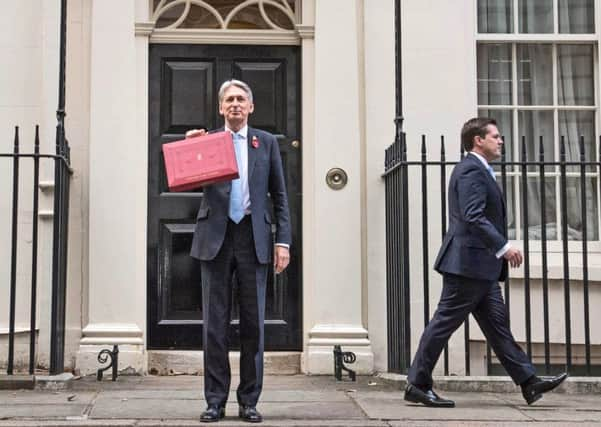Budget 2018: Austerity's end depends on a Brexit deal '“ leader comment


A common refrain used by Theresa May and hard Brexiteers alike about negotiations with the European Union has been that “no deal is better than a bad deal”. It always sounded like a bluff designed to persuade the EU that the UK Government was prepared to walk away from the talks if it didn’t get what it wanted.
The hard Brexiteers probably did really mean it, but if there was any doubt that it was a transparent bluff on the UK Government’s part, then Philip Hammond’s Budget speech should have removed it.
Advertisement
Hide AdAdvertisement
Hide AdOn Sunday, the Chancellor revealed he would have to set a new Budget in the event of a no-deal Brexit and yesterday he repeatedly stressed the importance to the health of the UK economy of reaching a deal.
The stakes, he said, “could not be higher” and getting it right would “protect Britain’s jobs, businesses and prosperity”. The country would also reap what he called a double “deal dividend”. There would be an economic boost from “the end of uncertainty” and also a second one as he would also able to release “some of the fiscal headroom” he is currently holding in reserve in case things go awry.
Those apparently still clinging to the idea that Britain has a chance of a “have our cake and eat it” Brexit may be angry that Hammond has exposed Britain’s cunning bluff to the 27 poker players on the EU’s side of the table. But he wasn’t really giving the game away, it was already blindingly obvious.
Hammond’s ‘big announcement’ was he agreed with May that the “era of austerity is finally coming to an end”, although he could hardly have disagreed and it was the least he could have said. But he made sure everybody knew the small print on this a pledge, detailing how it was very much subject to Brexit’s terms and conditions.
This was a message to hard Brexiteer rebels on the Conservative benches that if they managed to wreck any Brexit deal negotiated by the Government, propelling the UK into a chaotic no-deal Brexit, it would snatch economic prosperity from the grasp of the “hard-working families” in Britain after ten long, hard years of austerity.
He ramped up the pressure further by announcing that the income tax personal allowance and the higher tax threshold would both rise – to £12,500 and £50,000 respectively – from next year, making this an income tax-cutting Budget that party right-wingers who make up the bulk of hard Brexiteers would normally applaud.
But Hammond also announced some fairly major multi-billion-pound spending commitments that will see the amount the Scottish Government gets from the UK pot rise by £950 million over three years with “larger sums to come” to reflect increases in NHS funding.
Scottish Finance Secretary Derek Mackay, who had challenged the Chancellor to “show me the money” to prove the end of austerity, wasn’t impressed, claiming Scotland and “particularly the NHS” were being “short-changed”. “The reality of today’s Budget is that Scotland continues to be hit by UK austerity and the decision to leave the EU,” he said.
Advertisement
Hide AdAdvertisement
Hide AdIn the Commons, Jeremy Corbyn tetchily insisted that austerity was not over and complained about “ideological tax cuts to the richest in our society” after years of wage cuts for public sector workers. It was, he said, a “broken promises Budget”. His manner contrasted with the cheerful demeanour of the self-styled “Fiscal Phil” as he delivered his speech with a couple of well-aimed jokes at his Labour counterpart John McDonnell’s expense and bad puns about toilets. The Chancellor knew he had a good story to tell, but his main point was that it was all dependent on a Brexit deal.
